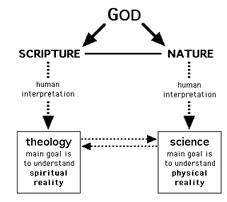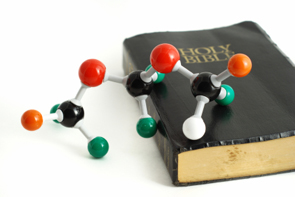When science and scripture disagree, there are three options: We can reject science, reject Scripture, or find a way to fit the two together.
I am of the third opinion, but with some qualifications.
Scripture and Nature
First, despite my post yesterday, we must recognize that the debate is not exactly between Scripture and Science. Scripture is raw data, but science is not. Science is the interpretation of the raw data that is found in nature. The real comparisons are between Scripture and Nature. The interpretation of the data of Scripture leads to theology, and the interpretation of data of Nature leads to Science.

So we can never really say that Science contradicts Scripture. It doesn’t. Nature and Scripture cannot disagree, because both are simply the pools of data from which Science and Theology come. When Science and theology are at odds, it is only because one or the other has misinterpreted and misunderstood the data.
So when someone gets upset that “Science is undermining the Bible!” what they are really saying is that “Science is undermining my understanding of the Bible.” The two are very different. We must be careful to not equate our theology with Scripture. The two are not the same.
Theology Does Affect Science
Second, although many Christians feel that science is always attacking theology, and theology always gets the short end (see yesterday’s post), this is not true. Theology often forces science to adjust. Many of the greatest adjustments and advancements in science are only because scientists approached nature with a Scriptural worldview.
 Many believe that the Enlightenment was the death-knell of religion, but what they don’t realize is that many of the leading scientists of the Enlightenment Era were Bible-believing Christians who went to nature looking for the order and beauty and logic that they believed they would find there as a result of their belief that God was created nature.
Many believe that the Enlightenment was the death-knell of religion, but what they don’t realize is that many of the leading scientists of the Enlightenment Era were Bible-believing Christians who went to nature looking for the order and beauty and logic that they believed they would find there as a result of their belief that God was created nature.
Even today, it can easily be argued that a proper theology about the dignity of all people, the goodness of creation, and the divine purpose of governments and corporations is challenging and changing some of the dehumanizing elements of scientific achievement and advancement. Though many parts of the church were wrong about slavery, it was not science that defended the inherent dignity and freedom of all humans, but theology. The same goes for issues related to poverty, justice, immigration, and a whole host of other social and cultural issues. Theology informs and guides science, just as science sometimes forms and correct theology.
Revelation is Not a Hierarchy
I began this series on Divine Revelation by talking about the hierarchy of revelation that is found in many theology books and seminary class rooms.
But I don’t think a hierarchy is the proper way to look at things. It is not an issue of which form of revelation is best, and which “truth” trumps the others. I don’t view theology anymore as an ordered list. (Ironically, that is a very scientific way of viewing truth.)
Revelation is a Bouquet of Roses
 Instead, I view the various forms of revelation from God like a bouquet of flowers. While one type of flower in a vase is very nice, the bouquet only gets better if you add a few other flowers to the mix, with some greenery and baby’s breath, and a nice glass vase.
Instead, I view the various forms of revelation from God like a bouquet of flowers. While one type of flower in a vase is very nice, the bouquet only gets better if you add a few other flowers to the mix, with some greenery and baby’s breath, and a nice glass vase.
That is how revelation works. Yes, like a dozen roses, theology is good. But it can be better if we add some science, some leafy logic, and creative placement of conscience, all arranged in a way that is pleasing to the eye and the nose (Yes, some theology just stinks).
Sometimes, if the flowers get too overwhelming, you might take one or two. If they are being hidden, you might add one or two, or remove some of the filler. The goal is to make it all fit together and work together, complementing each other in a way that makes sense of all the data.




Ideally, Scripture would be the raw data which, when interpreted, leads to a cohesive theological system. Does interpretation alone account for such a cacophony of voices telling us their “correct” theologies? Could it be that it is nigh unto impossible to approach the raw data of Scripture without at least some preconceived notions of what it might mean?
If such a project were possible, I wonder what would emerge if someone could find a group of twelve intelligent Buddhists or Hindus who had no previous knowledge of the Scripture and no contact whatsoever with any Christian, who would be given only the Scripture and unlimited time to study it and come up with a “theology”. What would it look like?
Unless we believe that Scripture was dictated by God, undoubtedly the personalities of the writers got involved. Might this also include their preconceived notions? Might some have reflected societal/cultural attitudes in their writing? Might someone who had never married have a different attitude about women than someone who was married?
Is it possible that some of the writers of Scripture were themselves giving us their “interpretations” of what they had experienced? Even perhaps their opinions? Paul even says at least once that he is giving what amounts to his opinion. Might that have been true at other points in what he wrote, but he neglected to mention that he was giving us his “opinion”?
Even though I’m in the middle here, i”m stopping because the comment is alread too long.
Sam, all great questions, many of which are usually not considered by traditional theologians.
A while back I had a Bible reading group with people who had little to no contact with Scripture for most of their life, and it was shocking the amazing things they pulled from Scripture which I had never seen there before.
I don’t think such a project as you propose is possible today, but I wish it were! I would love to be part of it.
I like your emphasis on science simply being our interpretation of the raw data around us. I remember hearing creationists saying that it’s not like evolution and creation each have their own facts – they have the same facts. The same world, the same fossils, the same rock layers. It’s just the presuppositions that they carry with them into their interpretations that make them different.
Yes, it is all in how the facts are interpreted and understood, and which facts are given more weight. The same thing happens in Bible interpretation.
It is the nature of science by building on established models(i.e. the solar system is heliocentric) to seek to affirm,extend,
and make new discoveries. Inherent in this system is a propensity
to make previous knowledge obsolete. This is especially true of
rationalistic hypothecating speculative soft social sciences. This is less true in the hard sciences, chemistry, biology, etc and others more amenable to empirical testing but
still the case. Scripture on the other hand has an aspect which can be inviolate in it’s veracity and not amenable to obsolence.
That is why it is called the fixed canon. That is an appeal to ultimate authority. In science that is called the Standard Model. It is interesting that the pursuit of the Unified Field Theory(the theory of everything) the holy grail of cosmic physics is beginning to look suspiciously like theology.(see String Theory and /or M-Theory.) I would suggest that if Christians wish to discuss science they should have some cursory
understanding of fields that speak to theological concerns.Life sciences,astrophysics,cosmology. The library contains many books aimed at many levels of complexity as I see school children writing reports so it should not be such a daunting task. ” be prepared to give a reason for the hope that dwells within you.” In any case scripture or science being open to interpretation always is reflective of the interpreter so consider the source.A fascinating documentary via PBS/internet is String Theory for a discussion of the line between science and (humanistic)theology becoming blurred.
Would your view of the Scripture change if:
1) Ancient manuscripts were discovered that fell into either or both of these categories:
-Autographs of books we find in the NT. However the autographs contain material that is not contained in the book we find in the NT and/or are missing material that is included in the book as we find it in the NT. Would this mean we can’t trust the Bible?
-Other ancient documents that state new and contradictory info about NT books, such as quoting parts of I Timothy and stating that the book was manufactured in Paul’s style, but had nothing to do with Paul. Same question – Does this mean we can’t trust the Bible?
2) On a more controversial topic, if new and additional “scientific” evidence is discovered that “proves” that being gay is not a personal choice, but that people are born that way (similar to race or skin color). Would we conclude the Bible is wrong, or that our interpretation is wrong (or what has been done up to this point – that the “science” is inconclusive or just plain wrong)?
There have been rumors for centuries that documents such as those mentioned in #1 have been found and either destroyed or hidden. I wonder what would happen if they come to light. Would the Christian faith be destroyed? All of these “what if” questions go to the heart of how we view Scripture, in my opinion.
Re: RE; NT variance> Class 1 See Citations Robert Eisenberg James the Brother of Jesus. Extensive. There are many ancient manuscripts by which to challenge inerrency. Class2 Dead sea scrolls, commentaries on Isaiah,Hosea,Micah, Nahum, Habakkuk, Zephaniah psalm 37, historical jewish messianic theology is foundational to biblical definition as for instance many symbols are clearly defined repetitively and ignored. In Class3 jewish apocalyptic lterature. I can name about 40 which were common in the early church. You have read a quote from Enoch 1 in Jude.
There is no need for manuscripts hidden in Vatican dungeons
or desert caves. They are in the Smithsonian. No point in speculating. The majority of assaults on innerrency are rooted in German higher critical thinking,and documentary
hypothosis as well as appeal to non canonical manuscripts.
and just plain lousy translation and interpretation.Also malignant unbelievers. we will ignore them. They have enogh problems. Speculative doubt is technically a fallacy of false cause leading to a fallacy of weak induction. Man there is a tar -baby Brer Rabbit. Ditto for new scientific evidence Mr. Darwin. It was an interesting idea until more science demolished the evolutionary hypothication with out appeal to scripture which is still standing on God spoken creation.
I don’t see any point in setting up straw men that are easily knocked down. I tend to avoid being an Ahgente Provacateure especially around new believers and small children, but in the context of these discussions we opine and cogitate. Pehaps we might b edified.
Riddle? Hell is eternal fire,..fire gives ofF light,..hell is the outer darkness,…no light,…how can this be? Hint.the Gehenna of jewish apocalyptic literature is describing something much worse,..
Elias, you have my attention. What is the “much worse” in Jewish apocalyptic literature?
My view of Scripture probably would change if either or both of the first two things happened.
Regarding gays, I would conclude that commonly accepted interpretation of Scripture is wrong. The prevailing winds seem to be moving in this direction anyway right now…
Did you get the e mail reply?
Hi Jeremy,
I agree 100% that real science can never contradict a proper theology. They are both the two wings in which we fly towards the truth. The study of sciences can deepen our understanding of God through his creative design. It is much like looking at the artwork to understand the artist.
Theology complements that and gives an understanding of God. It seems to me that both faith and reason are necessary.
Yet, it seems that faith goes above reason. When we use reason, we are making sense of the world around us through our minds. But our minds are finite, and has difficulty comprehending both the infinite and things foreign to it (eg. a blind person with colour). The ancient philosophers were able to deduce from reason that there is one God who exists.
However, with faith, you can go beyond that and understand truths that the mind would unlikely understand alone like the Trinity. Whilst reason uses our rationality and logos, faith is dependant upon the Logos.
Ultimately though, both science and religion should both be esteemed in any quest for truth.